7 Best High-Protein McDonald’s Orders, According to a Dietitian
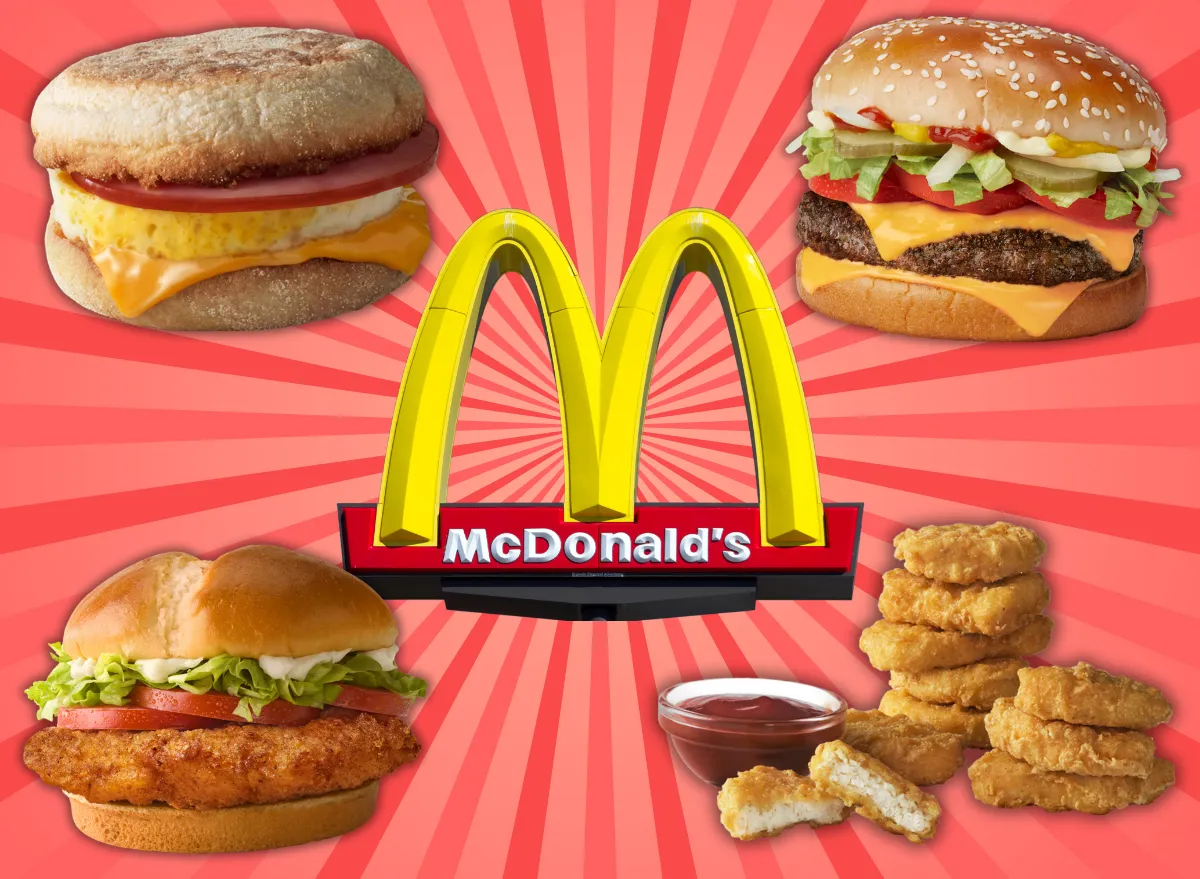
Some days, the convenience of a quick trip to McDonald’s is what your busy schedule allows. Trust me, I get it. As a dietitian and mom of two, I know the rat race of the mealtime rush all too well. Sure, you could whip up a store-bought burger at home, but that may not be practical. And that’s when a backup plan involving a trip to Mickey D’s isn’t such a bad idea. Yes, you heard me right. While you won’t hear me saying you should add this to your daily meal plan, the Golden Arches can occasionally provide a satisfying bite while offering some redeeming nutrition qualities—including a handful of high-protein options.
A powerful macronutrient, protein offers a variety of benefits that keep you full and support your muscle maintenance and growth. It may also help with appetite control and food cravings.
Remember that although a menu item may contain protein, it doesn’t necessarily mean it’s good for you. Other nutrients, like fiber, saturated fat, and sodium, also come into play. Before you pull up the nutrition information online and feel the panic rising, I’m here to help. With nutrition guidance and fine-tuning of the menu options, you can confidently navigate McDonald’s while prioritizing your protein needs and health. As you enter the drive-thru line surrounded by the latest value meal deals, here’s how to stay the course and focus on the better-for-you options that help achieve your goals, not derail them.
Tips for ordering high-protein, healthier options at McDonald’s:
- Aim for 15 or more grams of protein. Protein needs vary depending on age, gender, activity level, and lifestyle factors. The recommended dietary allowance for protein is between 46 and 56 grams for adults. While needs may be much higher for individuals, this amount covers the essential needs of a generally healthy person. Aiming for 15 to 20 grams of protein per meal, with additional protein delivered at snacks, helps set you up for success in meeting these numbers.
- Look for items that provide a source of fiber. Fiber helps keep you fuller for longer, keeping mindless munching at bay. While higher protein options at fast-food chains will not likely provide a high source of fiber (upwards of 5 grams), every gram counts. Add extra vegetables to your fast-food menu options and opt for the whole-grain bun when available.
- Limit saturated fat intake. The recent Dietary Guidelines for Americans recommend limiting saturated fat intakes to no more than 10% of your daily calories. For someone on a 2,000-calorie diet, that’s the equivalent of about 200 calories or about 22 grams of saturated fat total per day.
- Cut down on the salt. The recent Dietary Guidelines for Americans recommend limiting sodium intakes to no more than 2,300 milligrams per day, or about one teaspoon. Many fast-food items are higher in sodium, so it’s important to plan your other meals more wisely if a fast-food meal is on your radar that day.
The Best High-Protein McDonald's Orders:
- Deluxe McCrispy
- Quarter Pounder Deluxe
- 10-Piece Chicken McNuggets
- McDouble
- Sausage McMuffin with Egg
- Egg McMuffin
- Cheeseburger
Read on to learn why these are my top picks for the best high-protein McDonald’s orders, and next, check out The 20 Best High-Protein Fast-Food Meals.
Deluxe McCrispy (27 Grams)
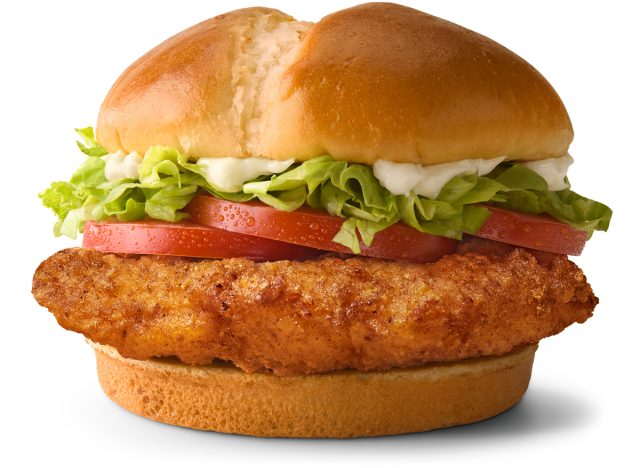
Calories: 430
Fat: 15 g (Saturated Fat: 2.5 g)
Sodium: 980 mg
Carbs: 48 g (Fiber: 2 g, Sugar: 10 g)
Protein: 27 g
While many fast-food chains offer a grilled chicken option (which helps reduce fat and sodium content), McDonald’s is not one of them. You can still enjoy the Deluxe McCrispy without derailing your goals. It packs 27 grams of quality protein and an additional gram of fiber compared to the standard McCrispy (thanks to the added lettuce and tomato that comes on the Deluxe). To lower the calories, saturated fat, and sodium, omit the mayonnaise. Since this is a higher sodium food choice at nearly 1,000 milligrams, be mindful of the other foods you eat that day.
Quarter Pounder Deluxe: 25 Grams
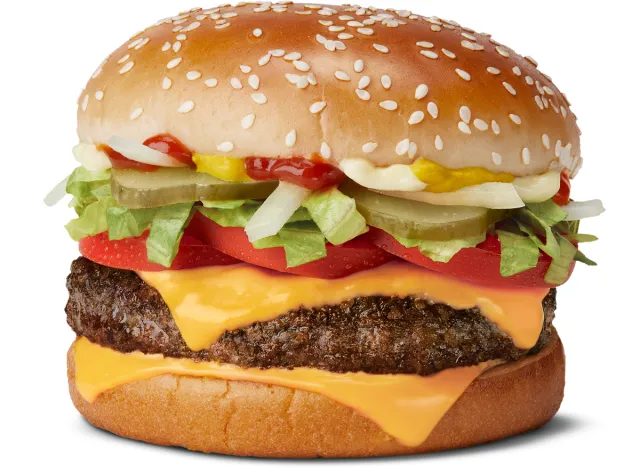
Calories: 430
Fat: 18 g (Saturated Fat: 8 g)
Sodium: 740 mg
Carbs: 41 g (Fiber: 3 g, Sugar: 10 g)
Protein: 25 g
If you’re a burger fan looking to increase your protein, go for the Quarter Pounder Deluxe and forgo the mayonnaise and cheese. This shaves off 200 calories, 470 milligrams of sodium, and 6 grams of saturated fat. The protein is lower by 5 grams, but the total nutrition improvement is worth it. Plus, again, by going Deluxe, you amp up the fiber to 3 grams versus 2 grams in the standard Quarter Pounder.
10-Piece Chicken McNuggets: 23 Grams
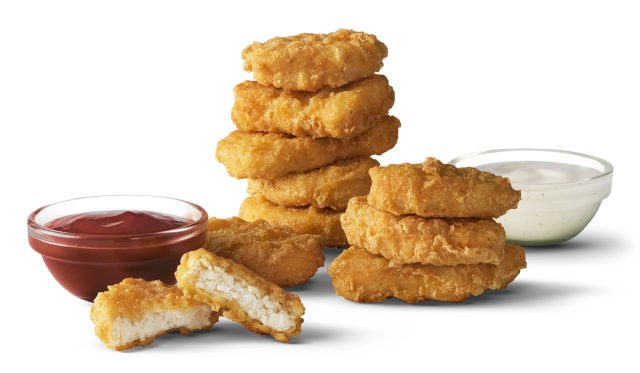
Calories: 410
Fat: 24 g (Saturated Fat: 4 g)
Sodium: 850 mg
Carbs: 26 g (Fiber: 1 g, Sugar: 0 g)
Protein: 23 g
The classic Chicken McNuggets are a high-protein option, delivering 23 grams of protein in the 10-piece order. Since these are deep-fried and don’t come with vegetables, they lack fiber and are higher in saturated fat and sodium than “naked” or baked chicken pieces available at other chain restaurants. If you’re grabbing take-out, consider grabbing the six-piece, as it offers 15 grams of protein but only 2.5 grams of saturated fat and 500 milligrams of sodium, and then add the chicken to a big salad at home.
McDouble: 22 Grams
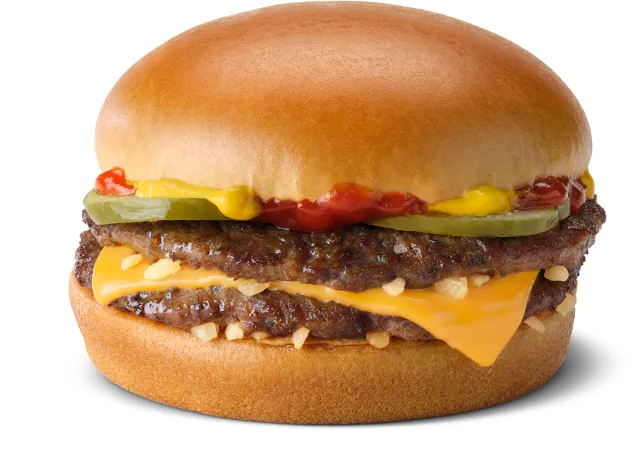
Calories: 390
Fat: 20 g (Saturated Fat: 9 g)
Sodium: 920 mg
Carbs: 33 g (Fiber: 2 g, Sugar: 7 g)
Protein: 22 g
You can order the McDouble as is if you enjoy cheese on your burger (with the caveat that it’s nearly 50% of your daily saturated fat allotment, so you will need to adjust your other eating options that day). The cheese (as well as the additional beef patty) boosts the protein to 22 grams versus 12 grams in a regular hamburger. However, since the amount of cheese used on this burger only adds 2 grams of protein, if you’re trying to keep your saturated fat intake down, you can nix it and save yourself 50 calories and 2 grams of saturated fat (that’s a 12% reduction when looking at daily values, too).
Sausage McMuffin with Egg: 18 Grams
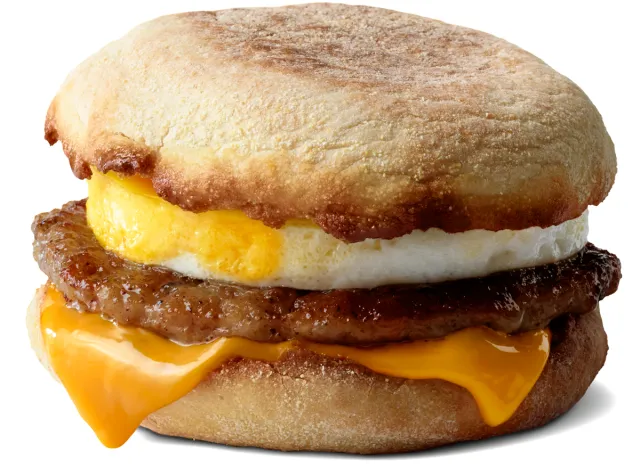
Calories: 410
Fat: 25 g (Saturated Fat: 8 g)
Sodium: 610 mg
Carbs: 29 g (Fiber: 2 g, Sugar: 2 g)
Protein: 18 g
If you’re looking for an option to offer some protein at the start of your day, then the next two menu items are worth considering. The Sausage McMuffin with Egg provides 18 grams of protein—that’s nearly triple the amount of protein than the Fruit & Oatmeal (and with 29 grams less sugar!). Plus, it’s made with cage-free eggs, a nutrient powerhouse that packs eight essential nutrients. One caveat: This sandwich contains 62% of your daily value of saturated fat and 36% of the daily value of sodium when ordered as is, so consider opting out of the cheese and butter to lower the saturated fat by 20% and sodium by 10%.
Egg McMuffin: 17 Grams
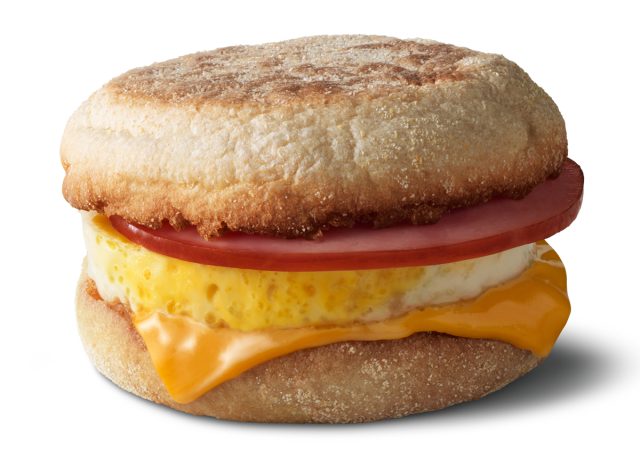
Calories: 310
Fat: 13 g (Saturated Fat: 6 g)
Sodium: 770 mg
Carbs: 30 g (Fiber: 2 g, Sugar: 3 g)
Protein: 17 g
The Egg McMuffin is likely your go-to breakfast option if you prefer bacon to sausage. With 1 gram less protein than the Sausage McMuffin, it’s also more forgiving with its saturated fat content at 6 grams versus 8 grams. And, if you ask to omit the butter, you’ll save 1.5 grams of saturated fat, too, without losing the cheese (and the protein it offers.) In addition to the protein from the egg, it’s also prepared with Canadian bacon, a leaner pork choice that packs 6 grams of quality protein with only 30 calories and 0.5 grams of saturated fat in a 1-ounce serving (approximately 30 grams). For comparison, while a standard slice of pork bacon contains the same amount of calories with 3 grams of protein, it delivers 1 gram of saturated fat for a 6-gram serving. To have an equivalent serving size, you’d nearly quadruple the saturated fat content using classic bacon.
Cheeseburger: 15 grams
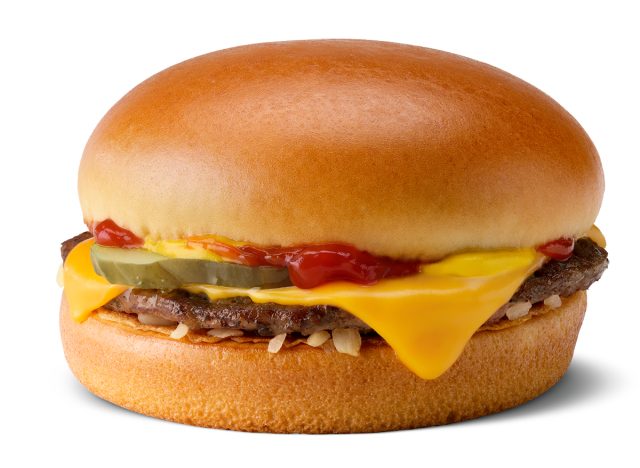
Calories: 300
Fat: 13 g (Saturated Fat: 6 g)
Sodium: 720 mg
Carbs: 31 g (Fiber: 2 g, Sugar: 6 g)
Protein: 15 g
The McDonald’s Cheeseburger is a lighter option than the McDouble, and it still satisfies hunger and packs a decent amount of protein at 15 grams. Taking a bite may even transport you back to your early years and memories with the classic Happy Meal.
If you’re tempted to add the small fry to live in the moment, it’s not as bad as you think. While it will add 230 calories to your meal (unless you split with a friend), a small fry also provides 3 grams of filling fiber and protein with only 1.5 grams of saturated fat. Remember, fiber helps keep you fuller for longer, too, and as much as I wish the menu offered more options to up your fiber intake, the fries are one of the highest-fiber choices on the menu. With that said, if you have your goals top of mind, consider adding low-fat milk to up your protein with an additional 8 grams (and just 100 calories).
Why Trust Eat This, Not That!?
Eat This, Not That! is committed to creating high-quality content that you can trust to be accurate, properly researched, routinely reviewed, and updated with the latest information. Our writers, editors, and medical and/or certified experts consider this to be an unwavering promise we make to our readers in the pursuit of delivering impactful and meaningful content.
- Source: Leidy H. J. (2014). Increased dietary protein as a dietary strategy to prevent and/or treat obesity. Missouri medicine, 111(1), 54–58.
- Source: Carbone, J. W., & Pasiakos, S. M. (2019). Dietary Protein and Muscle Mass: Translating Science to Application and Health Benefit. Nutrients, 11(5), 1136. https://doi.org/10.3390/nu11051136
- Source: Leidy H. J. (2014). Increased dietary protein as a dietary strategy to prevent and/or treat obesity. Missouri medicine, 111(1), 54–58.
- Source: National Research Council (US) Subcommittee on the Tenth Edition of the Recommended Dietary Allowances. Recommended Dietary Allowances: 10th Edition. Washington (DC): National Academies Press (US); 1989. 2, Definition and Applications. Available from: https://www.ncbi.nlm.nih.gov/books/NBK234926/#
- Source: Clark, M. J., & Slavin, J. L. (2013). The effect of fiber on satiety and food intake: a systematic review. Journal of the American College of Nutrition, 32(3), 200–211. https://doi.org/10.1080/07315724.2013.791194









